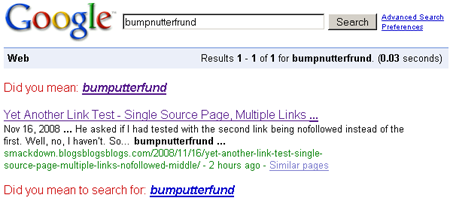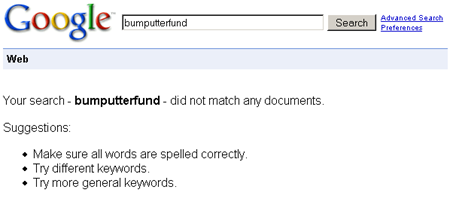The Google Search feature that Google calls “Spell Checker” can be very handy at times. You know the one I mean… you type something hastily in the box, manage to inadvertently slip in a typo or two, and Google, very helpfully, asks you “Did you mean: {some other word}”. Aside from putting a dent in the revenue for all of those SEO’s who are cleverly banking on people making common typos, most people (like myself) probably found the feature very helpful when it first came out.
However, I have to say, if the word typed in simply doesn’t exist, seriously… is there really any point whatsoever in offer an alternative word that also doesn’t exist? Google, for some odd unknown reason, seems to think so.
This weekend I set up a new links test based on a question someone had asked my in the comments on one of my old link tests. This involved me coming up with a few fictional phrases to test with. A couple of hours later I tried searching on one of those phrases, to see if it triggered the post to show yet. It did. It also, however, triggered an alternative search suggestion:
Having no idea what the hell the suggested phrase meant, and being the curious kind of guy that I am, I clicked through to the suggested “correct” spelling:
Now, according to Google’s description of their so called “Spell Checker”, the suggested phrase is going to be the “more common spelling”. This makes sense, because on the web the “correct” spelling often times has nothing to do with the one people are looking for (ie. Flickr), or the search isn’t even a real word, like “pwned”. However, in order for something to be “more common”, honestly, don’t you think it should at least exist…?
Seriousiciously, Google, if the word simply doesn’t exist, then there really is no point in making up words just to try and look helpful.


It is a new strategy to increase the AdWords market. Imagine someone typos, Google suggests a non-existing word and someone attaches meaning to the word. For example, bumputterfund may as well mean “A suggestion of Google to search for a non-existing word” or “Another screw up by Google” or “The fund for bump-challenged putters”. People start writing articles, selling stuff, showing AdSense, visitors click on them or others might even buy Ad Words. Voila, more money to Google.
Now add the scale of typos and possible new words and you get the Googolistic scale of profit 🙂
Most software spell checkers are not tied to official sources — they’re based on statistical analysis. That said, I have no idea how it works out in this particular case :-), it does seem a bit strange (as does your query :-))… If you’re interested, there’s a pretty neat posting about spell checkers by Peter Norvig (from Google) at http://norvig.com/spell-correct.html (where he explains how a spell checker written in 21 lines of Python works).
I would bet money that the spelling suggestions are from a database of actual search queries that Google has seen before.
Wow! That really is silly.
Amusing find, Mike. If I had to guess, I’d say Google cut up the word into chunks, saw the frund was maybe a so-called ‘fat finder’ typo (e.g. hitting two keys at once – f and r) and you meant ‘fund’, not ‘frund’…
I typed in “V!^@RA” and got a link to visual resources…
So that’s where all the spam has been coming from. LOL
Nah – they use a simple algorithm which concatenates dictionary words together:
bumpnutterfrund
BUMP NUTTER FRUND
BUMP UTTER FUND
Completely meaningless (and yes, produces no results) but each term they finally suggested is a real word. “Nutter” is slang, so probably not suggested, and “Frund”, uh, no.
In a way, smart, as most web domains started off this way.
http://www.bumpnutterfrund.com/
Nice test!